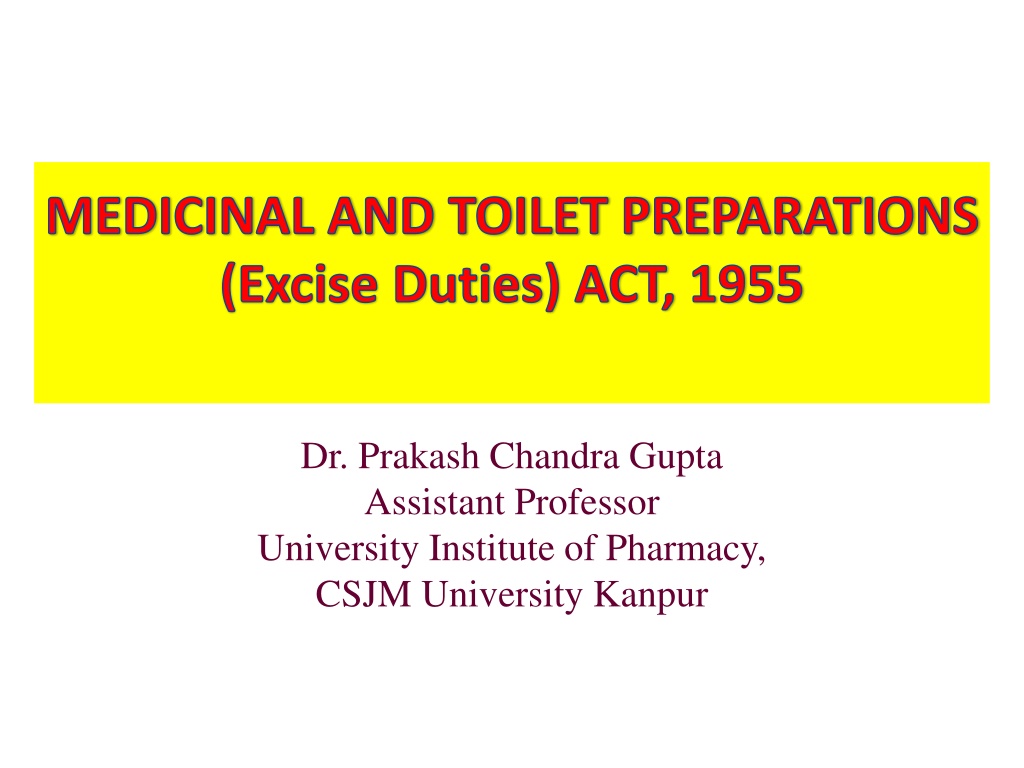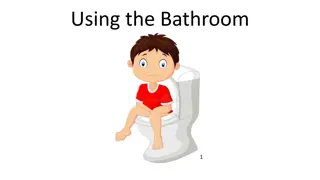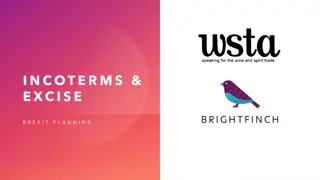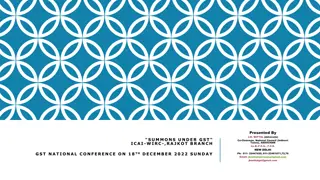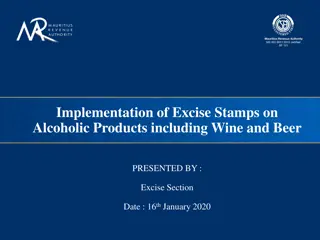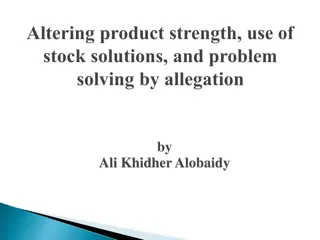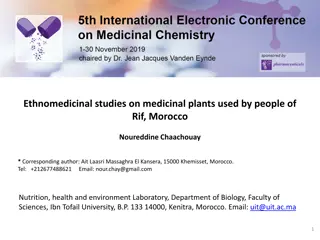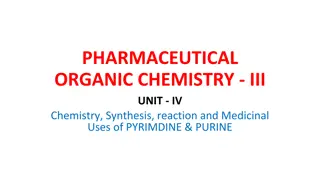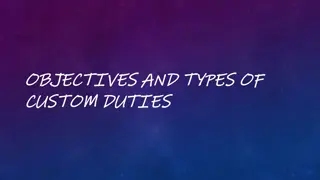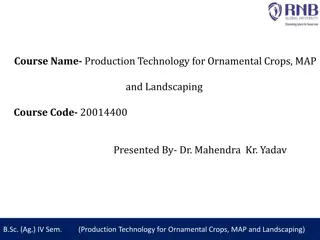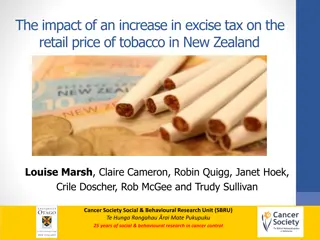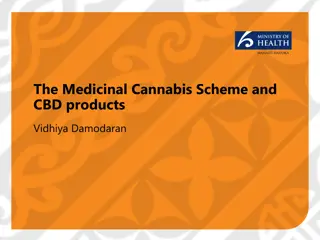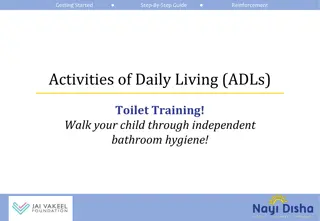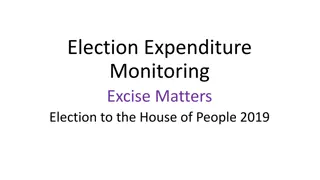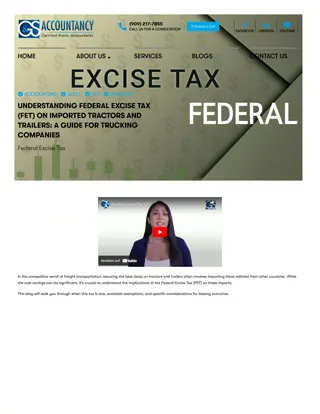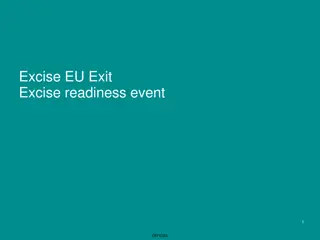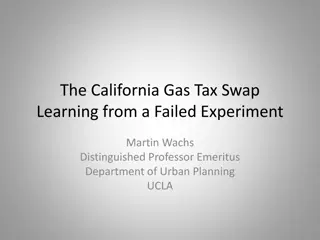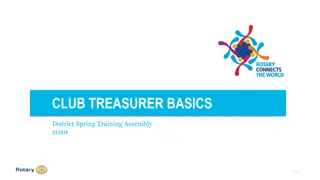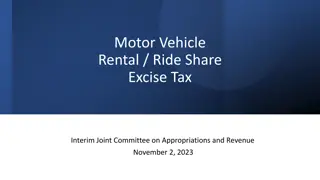Understanding the Medicinal and Toilet Preparations (Excise Duties) Act, 1955
The Medicinal and Toilet Preparations (Excise Duties) Act, 1955 was introduced to standardize excise duties on alcohol-containing medicinal and toilet preparations across India. It aims to regulate the collection of levies, ensure uniformity in duty rates, and address irregularities from previous acts, defining key terms like alcohol, dutiable goods, medicinal preparations, toilet preparations, and narcotic drugs.
Download Presentation

Please find below an Image/Link to download the presentation.
The content on the website is provided AS IS for your information and personal use only. It may not be sold, licensed, or shared on other websites without obtaining consent from the author. Download presentation by click this link. If you encounter any issues during the download, it is possible that the publisher has removed the file from their server.
E N D
Presentation Transcript
MEDICINAL AND TOILET PREPARATIONS (Excise Duties) ACT, 1955 Dr. Prakash Chandra Gupta Assistant Professor University Institute of Pharmacy, CSJM University Kanpur
INTRODUCTION Alcohol is an important industrial solvent. It is also an excellent preservative and a therapeutic agent. Use of alcohol for preparation of medicines is necessity Alcohol used either for drinking or manufacture of perfumes is subjected to higher duties than that of used in medicine preparation In the absence of uniform excise policy, the price of alcohol containing medicines was varying from State to State within the country. This is the reason to take this Act in existence
OBJECTIVE The Medicinal and Toilet preparation (Excise Duties) Act,1955 was passed with the following objectives : To provide for the collection of levy and duties of excise on medicinal and toilet preparation containing alcohol, narcotic drugs or narcotics. To provide for uniformity in the rules and rates of Excise duties livable on such preparation throughout the country To curb all irregularities of previous Act.
DEFINITIONS UNDER THE ACT Alcohol Means ethyl alcohol of any strength and purity having chemical composition C2H5OH Dutiable goods It includes the medicinal and toilet preparations specified in the schedule as being subject to the duties of excise levied under this Act Medicinal Preparation It includes the drugs used as a remedy or prescription prepared for internal or external use of human being or animals and all substances intended to be used for or in treatment, mitigation or prevention of disease in human being or animals.
. Toilet Preparation The preparation intended to be used in the toilet of human body or in perfuming apparel of any description, or any substances intended to cleanse, improve or alter the complexion, skin, hair or teeth, and include deodorants and perfumes. Narcotic drug or narcotic A substance which is coca leaf, or coca derivative, or opium, or derivative of opium, or Indian hemp and shall include any other substance, capable of causing or producing in human beings dependence, tolerance and withdrawal syndromes Government may, by notification in the Official Gazette, declare to be a narcotic drug or narcotic. and which the Central
. Bonded Manufactory It means the premises or any part of the premises approved and licensed for the manufacture and storage of medicinal and toilet preparations containing alcohol, opium, Indian hemp, and other narcotic drugs or narcotics on which duty has not been paid. Non-Bonded Manufactory It means the premises or any part of the premises approved and licensed for the manufacture and storage of medicinal and toilet preparations containing alcohol opium, Indian hemp, and other narcotic drugs or narcotics on which duty has been paid.
. Denatured Spirit or Denatured alcohol it means alcohol of any strength which has been rendered unfit for human consumption by the addition of substances approved by the central Govt. or by the State Govt. with the approval of the Central Govt. Spirit Store It is the part of the bonded or non bonded manufactory used for the storage of alcohol, opium, Indian hemp, and other narcotic drugs or narcotics purchased free of duty or at prescribed rates of duty specified in the Schedule to the Act.
LICENSING Manufacturing preparations can only be undertaken under the authority of a license granted for the purpose. Application for the license or for its renewal is to be made to Licensing authority who is the excise commission in the case of a bonded manufactory or warehouse and in other cases, such officer as the government may authorize in this behalf. The applicant for the license should submitted in the prescribed form accompanied with the prescribed fee, at least two months from the proposed date of commencement of the manufacture of alcoholic and narcotic
Following details should be submitted in the application for obtaining license: Name and address of applicant Place/site of the bonded laboratory If applicant is a firm then name and address of partners If applicant is a company then name address of directors, managers and managing agents and reg. no. of company. Amount of capital proposed. Number and full description of vats, stills and other apparatus and machinery. .
. Maximum quantities of alcohol remain at one time in the form of finished and unfinished preparations. Approximate date of starting production. Statement indicating that excise officer required full time or part time. Site and elevation plant of laboratory building The kind and number of each license under the drug and cosmetic act held by the applicant A list of all preparations which the applicant proposes to manufacture.
. On receiving application licensing authority verify: Qualification and experience of technical staff. Equipments of the laboratory Suitability of proposed building Soundness of applicant financial position The license remains valid for a period of one year and should be renewed thereafter. The license cannot be sold or transferred. The license remains valid for a period of one year and should be renewed thereafter. The license cannot be sold or transferred.
MANUFACTURE Supply of rectified spirit for manufacture of medicinal and toilet preparation Rectified spirit can be obtained from a distillery or a spirit warehouse of the State or outside the State. Mode of manufacture Manufacture of medicinal and toilet preparations containing alcohol shall be permitted in bond without payment of duty. In the case of manufacture in bond alcohol on which duty has not been paid shall be used under excise supervision; and in the case of manufacture outside bond, only alcohol on which duty has already been paid shall be used.
Manufacture in Bond Without previous payment of duty rectified spirit is issued only if the manufacture enters in to a bond with sufficient securities towards due payment of duty. Structures of the Bonded Manufactory There should be only one entrance to the bonded manufactory only one door for each of its compartments. A separate plain spirit store is required to be provided in the bonded premises. A separate large room for manufacturing of medicinal preparations One or more rooms for storage of finished medicinal preparation
. A separate room for manufacturing of toilet preparations and their storage. A room for Excise officer incharge nears the entrance with furniture. The bonded laboratory should be opened and closed in presence of Excise officer Incharge and secured with excise ticket locks. Every window in the bonded laboratory should be provided with iron rods not less than 19 mm in thickness set apart at a distance of not more than 102 mm. The iron rods should be embodied in brick construction to a depth of 51 mm at each end.
. The windows should be covered from inside with strong wire netting, the aperture of which should not exceed 25 mm in diameter. Each room in bonded laboratory should have a board indicating name and a serial number of the room and the purpose for which it is used, painted in oil color. The pipes from sinks in the laboratory should be connected to closed drainage ultimately, forming part of general drainage system. The gas and electric supply should be arranged in such a way that they are cut off at the end of day's work from one place.
1. Procurement of Rectified Sprit The spirit should be obtained from the spirit warehouse approved by the Excise Commissioner. Rectified spirit required for the medicinal and toilet preparations can be obtained on indent counter- signed by the officer in charge. Alcohol is issued in duly sealed containers and under intimation to the Excise Officer concerned. No wastage during transshipment is permissible and for any loss due to negligence of the manufacturer, excise duty has to be paid.
. 2. Verification and Storage of the Rectified Sprit On its arrival in bonded laboratory, alcohol is measured in volume and strength. The amount entered in the register maintained for the purpose. The sprit should be stored in spirit store room. 3. Issue of the Rectified Sprit from Sprit Store Calculated quantity of alcohol can be obtained on a requisition by the licensee to the officer-in-charge . All ingredients should be kept ready and on receipt of alcohol, the solvent should be mixed immediately in presence of excise officer.
. The preparation should be immediately removed to the store, measured and stored in vessels provided, entered in register and given a batch number. 4. Sample to be Taken On completion of production of medicinal or toilet preparation, the officer-in-charge shall permit the licensee to take free sample for analysis in his own laboratory and declaration of the strength of alcohol and medicaments. Samples may also be taken at any time by the officer-in-charge or other superior officer and such samples shall be sent to the Chemical Examiner for analysis and check.
. 5. Storage of Finished Products Medicinal and toilet preparation shall on completion of production be stored in jars or bottles. Such preparations ready for issue may be filled in bottles or containers of not less than 57 ml. content. Every container of a finished preparation shall bear a label showing the name of the preparation, its batch number, its alcoholic strength and the name of the manufacture. The containers shall be kept so arranged in suitable racks as to allow ready identification of each batch.
. 6. Issue of Alcoholic Preparation from a Bonded Manufactory Alcoholic preparation from a bonded laboratory can be taken out by manufacturer by making an application to excise officer and after payment of excise duty or it can be adjusted against any advance duty paid by him. Only on payment of calculated duty, the goods containing alcohol and narcotic drugs are permitted to be taken out of bonded laboratory by the excise officer. The licensee is required to maintain accounts in proper forms and registers.
. 7. Deficiency in the Finished Store A record shall be kept of all deficiencies in bulk content of any finished preparation in store by the officer-in-charge. A report of all such deficiencies shall be submitted by him at the end of each quarter to the Excise Commissioner. All such loss in the absence of a satisfactory explanation from the licensee shall be subject to levy of duty on the quantity so lost at penal rates which shall not be more than double the rates prescribed. medicinal and toilet
. 8. Disposal of Sub-Standard Preparations A finished medicinal or toilet preparation which is or is suspected to have deteriorated in quality may be destroyed by the manufacturer with the permission of the Excise. The manufacturer preparation. Excise Commissioner to re-process may a allow a sub-standard
. 10. Wastage in manufacture The State Government may, from time to time, fix the percentage of wastage in the production of a particular medicinal or toilet preparation. Any wastage exceeding the permissible limit and is not properly accounted for shall be charged with the duty together with such penalty not exceeding the duty livable thereon as the Excise Commissioner may deem fit. If the alcohol in strength of a preparation is found by the Chemicals Examiner to exceed the highest allowable limit by more than 30proof degrees or to be below the lowest allowable limit, its issue from the bonded manufactory, shall be withheld.
MANUFACTURE OUTSIDE THE BOND The work of manufacture and sale in the non- bonded manufactory shall be conducted between the hours of sunrise and sunset and on such days and hours as may be fixed by the Excise Commissioner. Essential requirements of manufactory are: Separate laboratory spirit store and finished store. Only one entrance to non-bonded manufactory One door each to laboratory, spirit store and finished store.
. The windows of the "spirit store" "laboratory" and "finished store" shall be fitted with malleable iron bars not less than 19 mm. in thickness, set not more than 102 mm. apart and fixed in the brick-work to a depth of at least 51mm. at each end. On the inside of each window there shall be securely fastened to the bars stout wire-netting the aperture of which shall not exceed 25 mm. in diameter. A separate spirit store for rectified spirit purchased at the specified duty. All pipes from wash basins and sinks are connected to closed drainage forming part of general drainage system
. 1. Indent for Rectified Spirit-Duty Paid Alcohol is procured by the manufacturer after payment of excise duty. The form for payment of duty is filled up in triplicate, one copy is to be given to spirit warehouse keeper, second to officer in charge of sprit warehouse and third to be retained by the licensee. The duty for alcohol purchased is to be paid to Government treasury and challan enclosed along with second copy of the indent.
. The treasury officer sends an advice of such payment to officer in-charge of sprit warehouse and after satisfying himself that the correct amount of duty has been paid, shall order the issue of rectified spirit required. The rectified spirit so brought into the non- bonded manufactory transferred to the spirit store and the necessary accounts written up in the register. shall be immediately
. 2. Manufacture, Storage and Sale Manufacturing, preparations should be carried out only in licensed premises. Each preparation manufactured registered and bear batch number. All finished preparations shall be transferred from the "laboratory" to the "finished store" and shall be so arranged that the checking of stock of every batch of preparation from the register is facilitated. storage and sale of shall be
. 3. Sampling The Excise Officer, without previous notice to the manufacturer, shall take samples of not less than 13% and not more than 15% of the total number of the medicinal and toilet preparations containing alcohol from the finished stocks at least once every month. Forward these samples to the Chemical Examiner for analysis thereof. alcoholic contents
. If the proof strength reported by the Chemical Examiner is differs by more than 30 strength as declared by the manufacturer,, the manufacturer is liable to a penalty at the rate of 10 times the difference in duty in the quantity so manufactured but not exceeding Rs. 2,000. If such differences are found to occur frequently, the Excise Commissioner may order the cancellation of the license held by the manufacturer. proof
. Samples of finished products may also be taken at any time by the Excise Commissioner. 4. Employees The manufacturer shall Commissioner a list containing the names of all employees whose duties require them to another non-bonded manufactory. He shall promptly inform the Excise Commissioner and the proper officer of any changes in the list from time to time. No person other than the person whose name is contained in the list shall enter the manufactory without the special permission of the proper officer. furnish the Excise
. 5. Inspection The non-bonded manufactory shall at all reasonable times be open a inspection by the Excise Commissioner and other Excise Officer having jurisdiction over the area in which the manufactory is situated. The proper officer shall inspect the non- bonded manufactory at least once every month.
OFFENCES AND PENALTIES Offence: Non-compliance with conditions of license and failure to pay duty or Failure to supply any information asked or supplies false information; or Attempting or committing the commission of any offence Penalty : Imprisonment upto six months, or with fine which may extend to two hundred rupees, or with both
. Offences with respect to warehousing Offence: Opening any lock or door of warehousing without prior consent; or Making any alteration in warehouse without prior consent; or Warehousing or removing goods in contravention of the rules; or Privately removing or concealing any goods either before or after being warehoused; or Penalty: Fine upto Rs. 2000/- and goods liable to confiscation. Obstructing the officers and give false information:- Fine upto Rs. 500/- Wilfully and maliciously giving false information and causing arrest:- Imprisonment upto 2 years or fine upto Rs. 2000/- or both Breach of any rule where no penalty is provided- Fine upto Rs. 1000/- and goods liable to confiscation.
